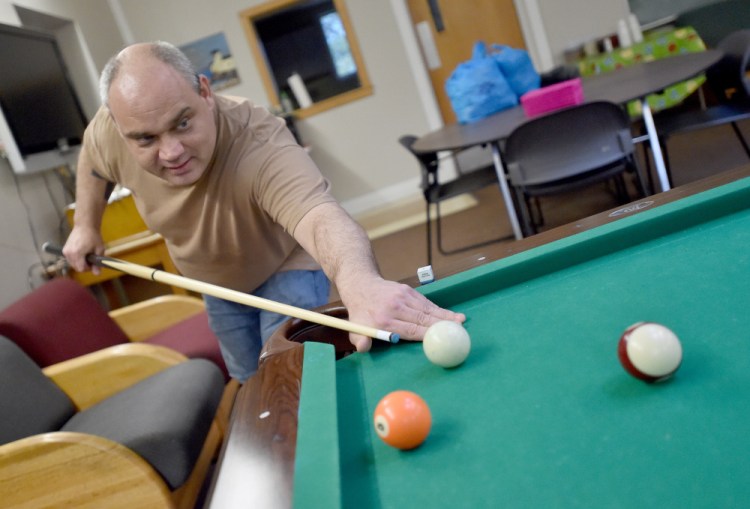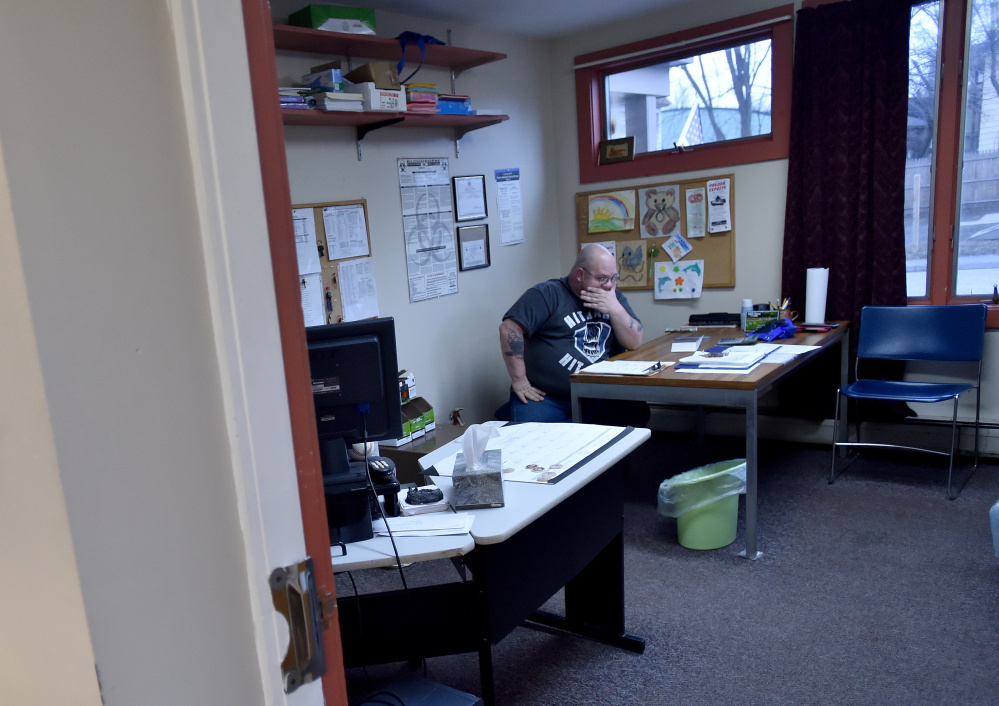WATERVILLE — Those who manage the Waterville Social Club on Ticonic Street say the state apparently will continue funding the center, which serves people with mental illness, but under a different model that will exclude most of its current members.
Club officials were alarmed last month that the Waterville club might be forced to close as part of state Department of Health and Human Services changes to such organizations in Maine. DHHS, which funds the Waterville center and 11 others statewide, has since backed off that original plan by revising a request for proposals that would enable the Waterville club to stay open.
But the department soon also will require the centers to train club members to seek employment, learn computer skills, write a resume and do other work. Those requirements worry local club officials.
The club for 32 years has served people with mental illness and those who find themselves in emotional distress. It is a place where they can socialize and recreate, learn to cook, do artwork, play games, do laundry, take a shower or read the newspaper. Some are homeless and have no friends or family.
Gary Stevens, site manager for the Waterville club, say many club members with severe mental illnesses would not be able to learn skills and go into the workforce, as DHHS is requiring. Some are of retirement age and well into their 60s, 70s and 80s, he said.
Five hundred to 550 people a month visit the Waterville club, with about 25 visitors every day. They make the rules and determine what activities will take place in the peer support center. When the state changes occur, members will have nowhere to go and they are frightened, Stevens said.
“That’s a big concern to me, that they’re going to displace this population and bring in a new population,” he said. “It would pretty much remove all the members we deal with here. They won’t fit in. They’ll pretty much be shut-ins. They won’t go anywhere.”
The club is supervised by Motivational Services Inc. John Painter, service director at Motivational Services Inc., supervises both the Waterville club and the Living in the Community Wellness Center — LINC — on Memorial Drive in Augusta.
Both he and Stevens say a successful vocational-focused club already exists at the High Hopes Clubhouse in Waterville, where people with mental illnesses train to go into the workforce. Painter said research shows that not just one model works for all people with mental illnesses.
He compared the state’s plan for changes to the centers to a scenario in which a person goes to the doctor because he has high cholesterol and the doctor puts him on high cholesterol medicine without any discussion about exercise or diet.
“I think it’s really short-sighted and risky to have a one-size-fits-all approach,” Painter said. “I’m concerned that it absolutely doesn’t take into consideration people coming into the center.”
In 1989, a class action lawsuit was filed when a group of people at the Augusta Mental Health Institute, or AMHI, now the Riverview Psychiatric Center, died because of maltreatment at the hands of the state. The result was the state agreed to do a number of things to create safe and effective mental health services.
The Waterville and Augusta social clubs provide that service, Painter said. The intent of the service is to help people who experience devastating emotional illness, or are recovering from substance abuse, or both, to begin to rebuild their lives, as often they have no friends or family, according to Painter.
CHANGING THE MODEL
The state has not spelled out exactly how the peer-run recovery centers would work, according to Painter. Unlike Stevens — who thinks current Waterville club members would be excluded from attending — Painter said it might be that they are allowed to continue coming, but they would just sit and watch others involved in the job-related activities.
The Waterville Social Club, he said, has played a critical role for many years and at a low cost to Maine taxpayers — $10 per day per person, as opposed to a Medicaid cost that would be $12 per 15 minutes per person. The Waterville and Augusta clubs each get $119,000 annually in funding from DHHS.
Painter, a psychiatric rehabilitation practitioner who has worked 16 years at Motivational Services, said that in all the literature about people in recovery for substance abuse, it is clear that “you don’t just tell people, ‘You drink alcohol to excess — you have to go to AA.’ It’s not the only model. It’s not the only thing that works. It’s great for many people, but it’s a one-size-fits-all. The absolute worst way to approach a public health issue is to mandate one way of dealing with something.”
The state is asking for requests for proposals, or RFPs, from organizations wanting to supervise the peer support centers, with the required changes. RFPs have to be in by May 24 and the state’s fiscal year ends June 30.
The proposal-shopping appears to be a response to a bill making its way through the Legislature, L.D. 842, which would establish peer center reimbursement at $75,000 per center in 2016-2017. The bill received preliminary approval Thursday from the House and faces additional votes in both the House and Senate before final action.
Current peer centers themselves previously had come to the Legislature seeking more funding.
Painter said Motivational Services plans to submit an RFP and officials are starting to meet to talk about how they want to approach the situation. LINC has a grasp of what it wants to do; however, Waterville is different from the Augusta club, with older people who have been together a longer period of time, he said.
He said the state decided to change the model of the clubs after they requested more funding, as they had been flat-funded for about 20 years and were struggling financially. The state funded all the centers statewide with $1.3 million a year for those 20 years, he said.
As part of the state’s changes, two new clubs will be added — one Downeast and one in midcoast Maine — he said. Painter wonders where the funding will come from, not only to add two new clubs, but also to pay for training and equipment, including hardware and software, that will be needed in the 14 centers to try to help people get jobs. He said state officials informed him that funding will be added for the centers from a $155,000 mental health block grant and the one-time $75,000 sum that’s proposed in L.D. 842.
But that is still not enough to fund what the state is requiring, Painter said.
QUESTIONS, CONCERNS
The Waterville and Augusta clubs are in one of the state’s designated districts for peer support centers. The state’s initial RFP indicated only one center would remain open in each district, which concerned Painter and Stevens, who said either the Waterville or Augusta club would likely have to close, as only eight of the 12 centers statewide would remain open.
But the state recently amended the RFP wording to say there could be more than one peer center in a district, Painter said.
At a prebid meeting last month, questions, confusion and concerns dominated in response to the state’s RFP for peer-run recovery centers. DHHS officials told attendees that all the answers would be posted May 17 on the department’s website along with answers to written questions.
DHHS spokeswoman Samantha Edwards did not respond Friday to specific questions about whether current members of the Waterville Social Club will be able to attend the club once changes are made, whether members would be required to train for the workforce, or whether an alternative program would be put in place for those who are not able to train for work. She also did not respond to requests for comment about Painter’s concerns about the one-size-fits-all approach, how changes to the center would work and how they would be funded.
Instead, Edwards emailed the Morning Sentinel three paragraphs, the first of which says that on March 28, DHHS issued an amendment to the RFP that allows for one or multiple awards per public health district for peer-run recovery centers.
“Due to the regulatory limitations that exist with the competitive proposal process, further elaboration on the content of the RFP is not permissible at this time,” Edwards wrote.
The email also says contracts that don’t qualify as sole source or emergency procurements must be put out to bid competitively using the RFP process, because of Department of Administrative and Financial Services rules. “As these services have not been competitively awarded in the past, to remain in compliance with the regulation, the department is required to utilize the RFP process,” Edwards wrote.
An RFP states the minimum expectations that are proposed, but a bidder has latitude to craft a bid to include additional services or concepts for a service, Edwards’ email says.
“We analyze and review all concerns that prospective bidders have and work to ensure that they are incorporated in the RFP,” she wrote. “It is not until a contract is negotiated with the awardee that the expectations and services are finalized.”
Amy Calder — 861-9247
Twitter: @AmyCalder17
Send questions/comments to the editors.






Success. Please wait for the page to reload. If the page does not reload within 5 seconds, please refresh the page.
Enter your email and password to access comments.
Hi, to comment on stories you must . This profile is in addition to your subscription and website login.
Already have a commenting profile? .
Invalid username/password.
Please check your email to confirm and complete your registration.
Only subscribers are eligible to post comments. Please subscribe or login first for digital access. Here’s why.
Use the form below to reset your password. When you've submitted your account email, we will send an email with a reset code.